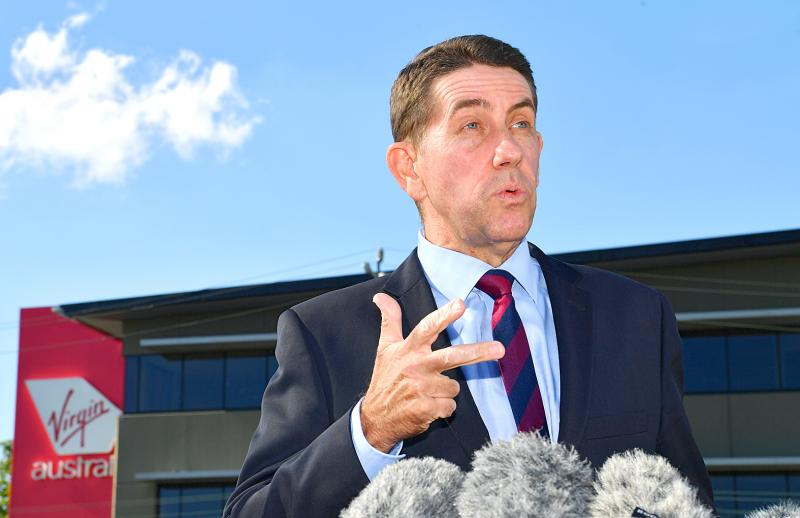Bain Capital LP agreed to buy collapsed airline Virgin Australia Holdings Ltd in one of the biggest single bets on the industry since it was shattered by the COVID-19 pandemic.
Administrator Deloitte yesterday named Bain as the airline’s new owner, hours after rival buyout firm Cyrus Capital Partners LP withdrew its bid.
The value of the deal was not disclosed, though Deloitte said there would be “a significant injection of capital” into the airline.

Photo: EPA-EFE
Virgin Australia’s shareholders, including some of the biggest names in aviation, such as Singapore Airlines Ltd and Etihad Airways PJSC, were wiped out.
Bain’s investment is a brave bet on a sector enduring its biggest crisis ever, as well as on the Virgin Australia business itself, the nation’s second-biggest airline.
Larger rival Qantas Airways Ltd this week depicted a bleak outlook, cutting 6,000 jobs, grounding about 100 planes and raising as much as A$1.9 billion (US$1.3 billion) to survive a prolonged downturn.
While domestic travel is slowly recovering, the Australian government has said the nation’s borders could be kept largely closed until next year.
Airlines worldwide are likely to lose US$84 billion and see their revenues halve this year, according to the International Air Transport Association, which expects this year to go down as the worst year financially in the history of aviation.
Virgin Australia collapsed in April under A$6.8 billion in borrowings as the pandemic halted global travel. Even before COVID-19-related restrictions nearly froze revenue, it had lost money for seven consecutive years.
The airline started as a low-cost domestic carrier in 2000, before destroying its balance sheet trying to compete with Qantas as a full-service operator, with routes to the US and Asia.
When it went under, Virgin Australia employed about 10,000 staff and operated 144 aircraft, generating almost 80 percent of its revenue from domestic flights. It had pushed back delivery of Boeing Co 737 Max jets to July next year, when it expected to receive the first of the 48 it had on order.
Deloitte said it was still not possible to determine how much of Virgin Australia’s debt could be recovered, though more details would come in a report to creditors that is due before the end of August.
However, shareholders can expect nothing, Deloitte said.
Virgin Australia was almost entirely owned by four foreign aviation groups: Singapore Air, Etihad, HNA Group Co and Nanshan Group Co, with each owning 20 percent. Richard Branson’s Virgin Group owned about 10 percent.
Deloitte’s decision ends an auction process that initially drew interest from more than 20 parties.
Cyrus exited yesterday with a fiery attack on the sale process, accusing Deloitte of a “lack of engagement” since the US investment group submitted its takeover proposal on Monday.
Bain’s deal might face a further challenge from Virgin Australia’s bondholders, who this week submitted their own plan to swap their debt for new shares under an independent board.
Moreover, the sale agreement with Bain still needs to be approved by creditors.
Virgin’s more than 10,000 creditors include about 9,020 employees, court filings show.

The demise of the coal industry left the US’ Appalachian region in tatters, with lost jobs, spoiled water and countless kilometers of abandoned underground mines. Now entrepreneurs are eyeing the rural region with ambitious visions to rebuild its economy by converting old mines into solar power systems and data centers that could help fuel the increasing power demands of the artificial intelligence (AI) boom. One such project is underway by a non-profit team calling itself Energy DELTA (Discovery, Education, Learning and Technology Accelerator) Lab, which is looking to develop energy sources on about 26,305 hectares of old coal land in

Taiwan’s exports soared 56 percent year-on-year to an all-time high of US$64.05 billion last month, propelled by surging global demand for artificial intelligence (AI), high-performance computing and cloud service infrastructure, the Ministry of Finance said yesterday. Department of Statistics Director-General Beatrice Tsai (蔡美娜) called the figure an unexpected upside surprise, citing a wave of technology orders from overseas customers alongside the usual year-end shopping season for technology products. Growth is likely to remain strong this month, she said, projecting a 40 percent to 45 percent expansion on an annual basis. The outperformance could prompt the Directorate-General of Budget, Accounting and

Netflix on Friday faced fierce criticism over its blockbuster deal to acquire Warner Bros Discovery. The streaming giant is already viewed as a pariah in some Hollywood circles, largely due to its reluctance to release content in theaters and its disruption of traditional industry practices. As Netflix emerged as the likely winning bidder for Warner Bros — the studio behind Casablanca, the Harry Potter movies and Friends — Hollywood’s elite launched an aggressive campaign against the acquisition. Titanic director James Cameron called the buyout a “disaster,” while a group of prominent producers are lobbying US Congress to oppose the deal,

Two Chinese chipmakers are attracting strong retail investor demand, buoyed by industry peer Moore Threads Technology Co’s (摩爾線程) stellar debut. The retail portion of MetaX Integrated Circuits (Shanghai) Co’s (上海沐曦) upcoming initial public offering (IPO) was 2,986 times oversubscribed on Friday, according to a filing. Meanwhile, Beijing Onmicro Electronics Co (北京昂瑞微), which makes radio frequency chips, was 2,899 times oversubscribed on Friday, its filing showed. The bids coincided with Moore Threads’ trading debut, which surged 425 percent on Friday after raising 8 billion yuan (US$1.13 billion) on bets that the company could emerge as a viable local competitor to Nvidia